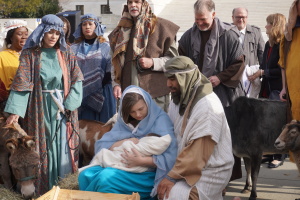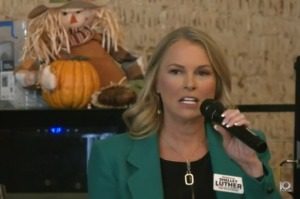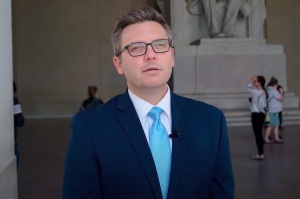Evangelicals Like It Hot
Supposedly global warming is the wedge issue that will peel evangelicals away from their conservative voting habits and their ostensible preoccupation with sexual mores. So when the president of the conservative-led 16 million member Southern Baptist Convention signed a Global Warming statement, headlines blazed, and the evangelical left cheered. But the church's president has since attempted to clarify. And the head of the denomination's official public policy arm is publicly opposing congressional legislation mandating increased carbon caps.
The March 10 "Southern Baptist Declaration on the Environment and Climate Change" was organized by 25-year-old seminary student Jonathan Merritt, the son of a former Southern Baptist president. His father and another former church president signed the statement, along with prominent seminary faculty, adding nearly 50 notable signatures. Conservatives solidified their control over America's largest Protestant denomination in the 1980's. And all of the declaration's signers profess to be conservative, though Page and others have vowed to represent a new generation of less combative conservatives.
According to the younger Merritt in a teleconference with the media, he had learned from a seminary professor that "when we destroy creation, which is God's revelation, it is no different than tearing a page out of the Bible." After God "began to work" on his heart, Merritt organized the Southern Baptist Environment and Climate Initiative. It complained: "We believe our current denominational engagement with these issues have often been too timid, failing to produce a unified moral voice. Our cautious response to these issues in the face of mounting evidence may be seen by the world as uncaring, reckless and ill-informed. We can do better."
Merritt's declaration further insisted: "Though the claims of science are neither infallible nor unanimous, they are substantial and cannot be dismissed out of hand on either scientific or theological grounds. Therefore, in the face of intense concern and guided by the biblical principle of creation stewardship, we resolve to engage this issue without any further lingering over the basic reality of the problem or our responsibility to address it. Humans must be proactive and take responsibility for our contributions to climate change – however great or small."
Richard Land, head of the church's official Ethics and Religious Liberty Commission, conspicuously declined to sign, disagreeing that the church had been "too timid." He also explained that endorsing a stance at variance with the church's official position would be "misleading and unethical." Land was referencing the church's 2007 resolution "On Global Warming," which was notably skeptical about human-induced climate change. It declared that "global temperature has risen and fallen cyclically throughout geologic history" and that the "scientific community is divided regarding the extent to which humans are responsible for recent global warming." It also warned that "forcing developing countries to comply with Kyoto will significantly inhibit their economic development and the development of the international economy" and that "proposed carbon offset programs will have little impact on reducing rising temperatures if human activity is not a significant cause of recent global warming." In the 2007 vote on this resolution, the voting "messengers" even opposed by a 60 percent margin any support for government research on the human impact on global warming.
In the wake of wide media attention, Southern Baptist Convention President Frank Page defended his endorsing Merritt's unofficial declaration while implausibly claiming that the charge of "too timid" was not really aimed at his own denomination. "I do not believe this is true of the Southern Baptist Convention in an official capacity," he insisted. "As Southern Baptist Convention president, I totally stand behind the resolutions that have been passed in recent years." Page went on to claim that "many of God's people" have been "timid" about environmentalism because of fears about the "very extreme left wing liberal environmental lobby." He insisted that he was "certain" that all the initiative's signers knew that "the scientific research on human-induced global warming is conflicting at best."
That response from Page apparently not mollifying widespread criticism from fellow Southern Baptists, he spoke again a week later. "Seldom have I seen such a reaction," he complained. "I have been called names that I have not been called in my entire life." He apologized for creating an impression that the declaration officially represented the church. But he insisted that he still "stands by the content of this document," while he was surprised at the "amount of energy" with which critics reacted. "We have been accused of being a part of a left wing, liberal agenda on global warming," he lamented. "There has been much misunderstanding, much anger, and much speaking of unkind and demeaning words." He hoped some of this anger could be redirected towards evangelism and other more positive outlets.
Meanwhile, almost concurrently, Richard Land's official church agency endorsed a March 17 letter to all U.S. Senators opposing mandated reductions in greenhouse gas emissions, called America's Climate Security Act (ACSA), sponsored by Joe Lieberman and John Warner. Both Land and his Washington-based subordinate, Barrett Duke, support the Cornwall Stewardship Agenda, which questions claims that climate change is fully man-made and warns against the impact of carbon caps on the world's poor. Joining with other conservative groups such as the Family Research Council, the Southern Baptist-backed letter complained that the bill's "underlying assumption" about human-induced climate change is "highly questionable." The Lieberman-Warner proposal would have an "imperceptible" effect on global warming "while doing grave harm to our economy, the poor and U.S. competitiveness," said the letter from Land and the other skeptics.
Interestingly, Senator Warner had been one of the featured speakers on the March 10 media teleconference call for Merritt's unofficial declaration. "I do hope your organization will come in behind us on the concept that we are the trustees of this planet and we should make that start so the rest of the world can see us leading and join us," Warner told the environmentally friendly Southern Baptists.
Overly conscious of stereotypes about their "fundamentalist" controlled church, Page and many of the other Southern Baptist signers of the Global Warming declaration seem more determined to disprove that they are "uncaring" than substantively address climate change. Following groups like the National Association of Evangelicals, they seem to believe that favorable media attention will enhance their prestige and their evangelistic outreach. But most Southern Baptists probably think differently, intuiting that churches thrive more when they are culturally contrarian than when they succumb to convention.
________________________________________________
Mark D. Tooley directs the United Methodist committee at the Institute on Religion and Democracy in Washington, D.C.




























